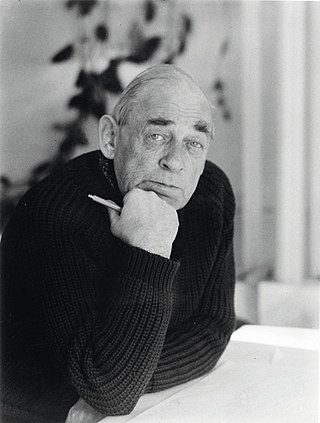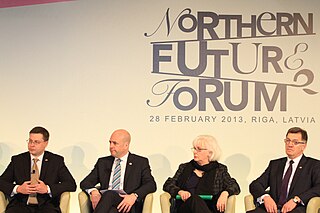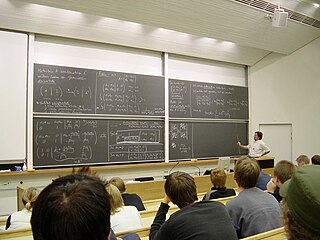
Hugo Alvar Henrik Aalto was a Finnish architect and designer. His work includes architecture, furniture, textiles and glassware, as well as sculptures and paintings. He never regarded himself as an artist, seeing painting and sculpture as "branches of the tree whose trunk is architecture." Aalto's early career ran in parallel with the rapid economic growth and industrialization of Finland during the first half of the 20th century. Many of his clients were industrialists, among them the Ahlström-Gullichsen family, who became his patrons. The span of his career, from the 1920s to the 1970s, is reflected in the styles of his work, ranging from Nordic Classicism of the early work, to a rational International Style Modernism during the 1930s to a more organic modernist style from the 1940s onwards.

Otaniemi (Finnish), or Otnäs (Swedish), is a district of Espoo, Finland. It is located near the border of Helsinki, the capital of Finland.

Helsinki University of Technology was a technical university in Finland. It was located in Otaniemi, Espoo in the Helsinki metropolitan area, and it was one of the three universities from which the modern day Aalto University was founded. The university was founded in 1849 by Grand Duke of Finland, Emperor Nicholas I and received university status in 1908. It moved from Helsinki to Otaniemi campus area in 1966. The merger of HUT with two other schools created the Aalto University in 2010, and HUT briefly held the name Aalto University School of Science and Technology before being split into four schools in 2011.
The Aalto University School of Business, is the largest business school in Finland. Founded in 1911, it is the second oldest business school in Finland and one of the oldest business schools in the Nordic countries. The school became part of Aalto University on 1 January 2010. It has been previously known as the Helsinki School of Economics, the Helsinki School of Economics and Business Administration, and during 2010–2012 the Aalto University School of Economics.

Aalto University School of Arts, Design and Architecture; Finnish: Aalto-yliopiston taiteiden ja suunnittelun korkeakoulu; Swedish: Aalto-universitetets högskola för konst, design och arkitektur), was formed of two separate schools: the faculty of architecture and the University of Art and Design Helsinki. TaiK, founded in 1871, was the largest art university in the Nordic countries. The university awards the following academic degrees: Bachelor of Science in Technology, Architect, Bachelor of Arts, Master of Arts, and Doctor of Arts.

AaltoMedia Lab is a transdisciplinary laboratory focusing on digital art and design and its impact to culture and society. The Lab is part of the Department of Art and Media at the School of Arts, Design and Architecture, Aalto University in Finland.

Dipoli is the main building of Aalto University, located in the university's Otaniemi campus in Espoo, Finland. It was designed by architects Reima and Raili Pietilä and opened in 1966. Dipoli was initially owned by the Student Union of the Helsinki University of Technology who sold it to Aalto University in 2014.

Aalto University is a public research university located in Espoo, Finland. It was established in 2010 as a merger of three major Finnish universities: the Helsinki University of Technology, the Helsinki School of Economics and the University of Art and Design Helsinki. The close collaboration between the scientific, business and arts communities is intended to foster multi-disciplinary education and research.
Aalto University Library, from 2015 called Aalto University Learning Centre is a service unit of Aalto University. The library is a scientific service organization free for everyone to use. It provides support for the diverse research, education, studying, and artistic activities of the university. Aalto University Library was established on January 1, 2010, by the merger of the libraries of Helsinki University of Technology, the Helsinki School of Economics, and the University of Art and Design Helsinki.

Aalto University School of Electrical Engineering is a part of the Aalto University and works in the area of basic research as well as in the field of latest technologies. School's four departments and the special units widely cover the fields of electronics, communications and automation. Special fields include automation and systems technology, electronics and information technology, power engineering, (wireless) communications engineering and bioinformation technology. The school provides engineering education for both Finnish and international students.
Ville Ilmari Miettinen is a Finnish serial entrepreneur and computer programmer. Miettinen was the co-founder and CTO of Hybrid Graphics, a graphics technology company acquired by NVIDIA in 2006. Miettinen is a founding partner at Lots, one of the accelerators in the Finnish governmental Vigo Programme. Miettinen is also the CEO and co-founder of the crowdsourcing technology company Microtask.

Aalto-1 was a Finnish research nanosatellite, created by students of Aalto University. Based on the CubeSat architecture, it was originally scheduled to be launched in 2013, it was launched on 23 June 2017. It was Finland's first student satellite project and indigenously produced satellite. As of 2021, the satellite was operational.
The startup scene in Finland has given birth to companies such as Angry Birds, Supercell, Wolt, and many others.

Northern Future Forum is an annual, informal meeting of prime ministers, policy innovators, entrepreneurs and business leaders from the 9 nations of Denmark, Estonia, Finland, Iceland, Latvia, Lithuania, Norway, Sweden and the United Kingdom. Initially referred to as the UK Nordic Baltic Summit, the name Northern Future Forum was introduced at the second meeting in Stockholm, 2012. The group had a period of abeyance since the Stavanger meeting in 2016 was postponed following the outcome of the 2016 United Kingdom European Union membership referendum, and David Cameron subsequently stepping down as UK prime minister, to be succeeded by Theresa May. The summit was reconvened in October 2018 in Oslo.

Yousician is a Finnish interactive and educational music service made to learn and play a musical instrument. It currently supports the following musical instruments: guitar, piano (keyboards), ukulele, bass, and voice.

Otaniemi Chapel is a Lutheran chapel located in the Otaniemi campus of Aalto University in Espoo, Finland.

Slush is a startup and tech event held annually in Helsinki, Finland. Slush facilitates meetings between the founders of startups and investors such as venture capitalists, accomplished with events such as matchmaking and pitching competitions. Slush aims to build a worldwide startup community. In 2021, Slush brought together 8,800 attendees from around the world to participate together in this global networking festival.
Junction is a hackathon organizer with headquarters Espoo, Finland. Started in 2015, Junction grew to be one of the largest organizers in Europe. In 2018 it expanded globally with a Junction event at Tsinghua University in China and cooperation with Chinese and South Korean universities bringing high performing students to attend the event in Helsinki.

In Finland, "teekkari" is a term used for students of institutes of technology. The term is also used for students of technical subjects in general universities and Bachelors of Science in Technology.

Otahalli is a sports venue in Otaniemi, Espoo, Finland. It is located by the sea in Otaniemi, adjacent to the Aalto University campus.














